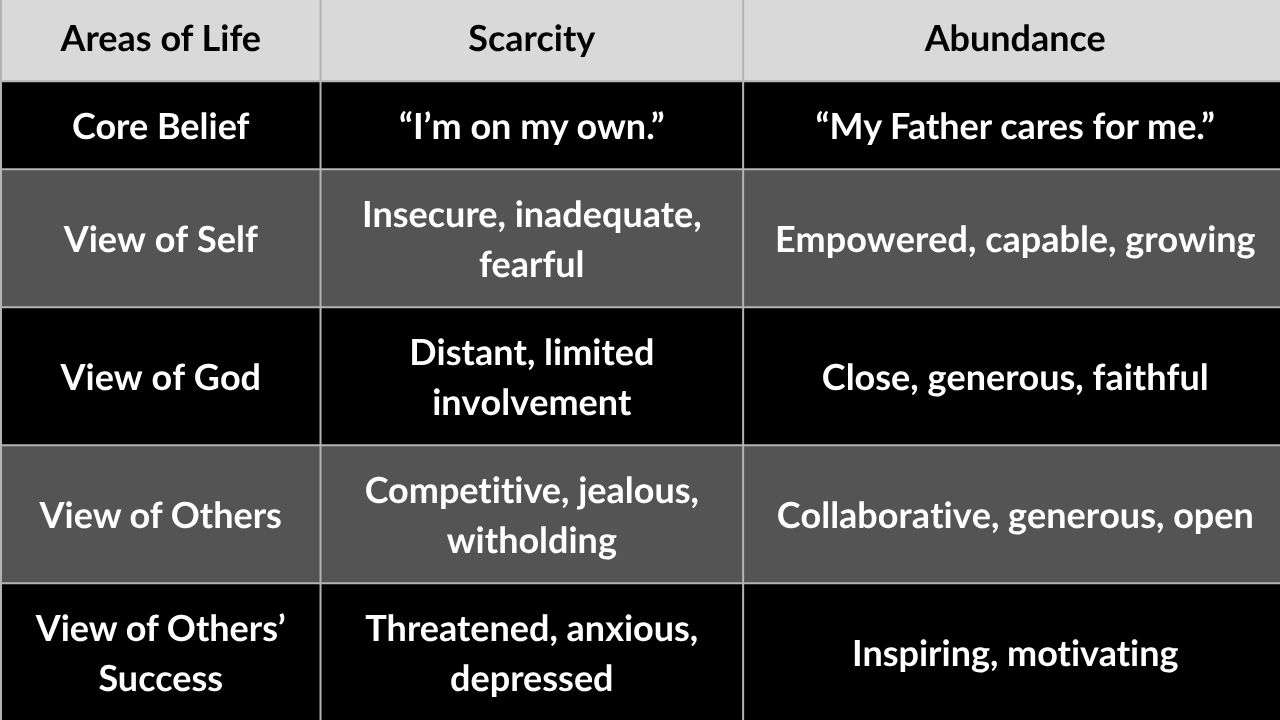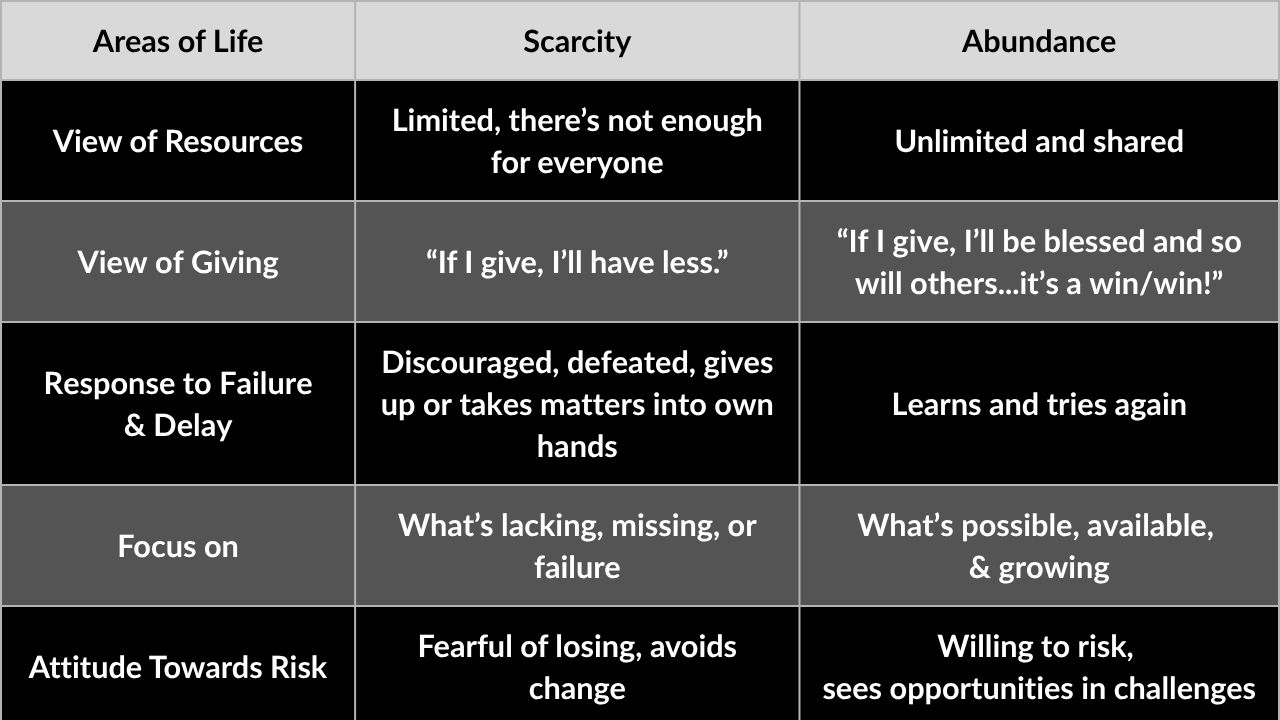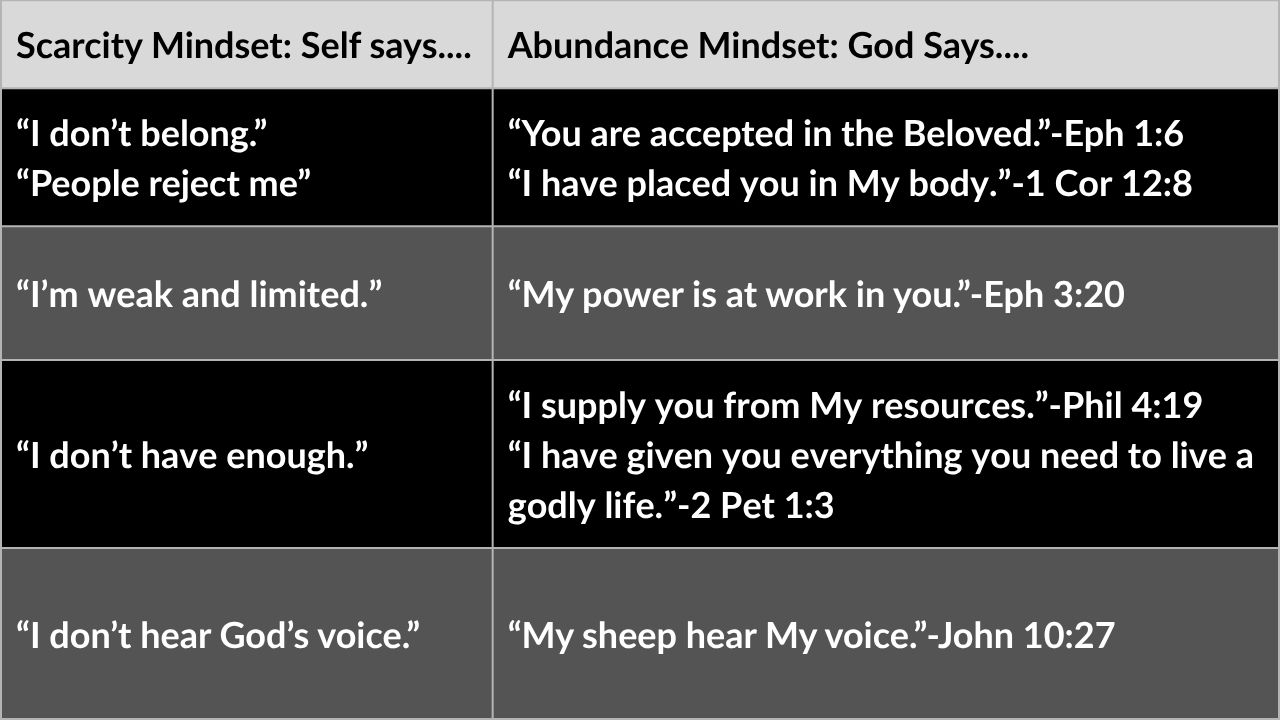I. Intro.
A. The first and greatest battle.
1. The first and greatest battle we will ever fight is in our own mind. The battle for what we believe will decide how much we experience the life that God has for us.
2. In John 10:10 Jesus said…
“The thief does not come except to steal, and to kill, and to destroy. I have come that they may have life,
and that they may have it more abundantly.”
a. abundantly: perissos, more than you need’, over & above, more than necessary
b. BTW… this issue of abundance is meant to challenge us so that we grow in faith.
3. I believe this verse speaks of the battle in our mind because the thief can only steal from us if we believe his lies, and we can only receive the Lord’s abundant life if we believe His promises.
4. How we fight the battle today will determine our quality of life tomorrow.
B. A War on Two Fronts.
1. This is a battle on two fronts: we fight in our mind and in our heart.
2. Remember we have three brains: the brain in our head, the heart and the gut.
a. head brain: rational, calculated thought
b. heart brain: what we really believe, emotional interpretation of logical facts
c. gut brain: intuition, instinct, sensing
d. the heart has over 40,000 neurons and stores memories
e. the intestines send more signals to the brain then the brain sends them
3. Romans 10:10 “For with the heart one believes unto righteousness, and with the mouth confession is made unto salvation.”
4. The battle in the mind is to believe that God’s promises are true, the battle in the heart is to believe that His promises are true for us.
5. EXAMPLE: Do you find it easier to pray for someone else to be healed than you do for
yourself? To have faith for someone else’s job or relationships than your own?
C. How do we win this battle to believe God’s promises are for us?
1. To win the battle for our mind, we have to renew our mind with the Word of God. To win the battle for our heart, we have to believe in our identity, that we are children of God.
2. The battle for the mind is won by the Word. Ephesians 5:26, Jesus is washing us with the water of the Word to make us without spot or wrinkle, holy and without blemish.
3. But the battle for the heart is won by the awareness and acceptance of our identity as a child of God and what God did for someone else, He will do for us.
II. This battle can be broken down into two opposing mindsets: the Scarcity Mindset vs the Abundance Mindset.
A. Two opposing ways of thinking.
1. The scarcity mindset and the abundance mindset are two opposing ways of thinking about ourselves, about God and about the world around us.
2. The decisions we make, how we relate to other people and how we plan for the future are all heavily influenced by these ways of thinking.
3. Scarcity is rooted in fear and lack. Scarcity minds assume that resources, opportunities and success are limited. People with this mindset compete, compare, hoard and hesitate.
4. Abundance is rooted in faith and provision. Abundance minds assume that God will provide more than enough for everyone. People with this mindset are generous, collaborative, open to growth and take risks.
B. Comparison table.


C. Biblical examples.
1. Abraham & Sarah (Scarcity)
a. Delay of God’s promise caused them to take control- trusting themselves instead of God. Their solution was for Abraham to have a child by Hagar.
2. The 12 Spies (Scarcity)
a. Even after miraculous deliverance from Egypt, after miracles in the wilderness and promises of God to drive out their enemies, 10 still saw themselves as the source.
3. Gideon (Abundance)
a. Even in the face of 450 to 1 odds, Gideon was self aware of his limited strength but trusted that God would do what He said and deliver him.
4. IN A NUTSHELL… Scarcity looks at the size of the problem, abundance looks at the size of the Provider.
D. Tested by the Lord.
1. Mark 6:30-44
30 Then the apostles gathered to Jesus and told Him all things, both what they had done and what they had taught. 31 And He said to them, “Come aside by yourselves to a deserted place and rest a while.” For there were many coming and going, and they did not even have time to eat. 32 So they departed to a deserted place in the boat by themselves.
33 But the multitudes saw them departing, and many knew Him and ran there on foot from all the cities. They arrived before them and came together to Him. 34 And Jesus, when He came out, saw a great multitude and was moved with compassion for them, because they were like sheep not having a shepherd. So He began to teach them many things.
35 When the day was now far spent, His disciples came to Him and said, “This is a deserted place, and already the hour is late. 36 Send them away, that they may go into the surrounding country and villages and buy themselves bread; for they have nothing to eat.”
1. The Lord’s response to the condition of these people is compassion.
a. splagchnizomai: (splawk-NEEDS-oh my) and it means ‘moved in the bowels’
b. a visceral reaction, gutted, etc.
c. Jesus was supposed to be taking some time off to rest but when He saw the condition of so many people He was gutted and gave them His time and wisdom.
2. But the disciples had a different reaction. They saw that the people had nothing to eat and their solution was to send them away.
37 But He answered and said to them, “You give them something to eat.” And they said to Him, “Shall we go and buy two hundred denarii worth of bread and give them something to eat?”
3. But Jesus comes back with… “You feed them.” And their response is sarcastic, which is a manifestation of unbelief in the case. 200 denarii is about $20-$30k in todays money.
a. Think about this in today’s terms… how much would is cost to cater an event for 5,000 people?
4. The disciples had a scarcity mindset:
a. There’s not enough resources
b. Focused on what they didn’t have
c. Felt inadequate
d. See God as distant, not involved
5. We need to understand that Jesus had already worked 18 miracles before this one. (In chronological order, the feeding of the 5,000 is the 19th.)
a. Turned water into wine at a Wedding in Cana (6 water pots)
b. Miraculous catch of fish
c. Calmed to storm on the sea
d. Raised there dead, healed the sick and cast out demons.
6. Is this our attitude to the challenges we face? “Lord, send them away!” Are we looking at our limited resources or are we looking to the Lord?
38 But He said to them, “How many loaves do you have? Go and see.” And when they found out they said, “Five, and two fish.” 39 Then He commanded them to make them all sit down in groups on the green grass. 40 So they sat down in ranks, in hundreds and in fifties. 41 And when He had taken the five loaves and the two fish, He looked up to heaven, blessed and broke the loaves, and gave them to His disciples to set before them; and the two fish He divided among them all. 42 So they all ate and were filled. 43 And they took up twelve baskets full of fragments and of the fish. 44 Now those who had eaten the loaves were about five thousand men.
7. Jesus tells them to go and see if there was any food among them and they find a boy with five loaves and two fish. (John 6:9)
a. The disciples saw the multitude as a problem they wanted to ignore- Jesus saw the multitude and was moved with compassion to feed them.
b. The disciples said “Lord, send them away” but Jesus said “There’s a solution in there somewhere.”
III. How to fight this battle and win.
A. To win the battle in the mind, we have to renew the mind.
1. Romans 12:2
“And do not be conformed to this world, but be transformed by the renewing of your mind, that you may prove what is that good and acceptable and perfect will of God.”
a. Sometimes we operate out of culture instead of Kingdom.
b. Automatic behaviors, look out for #1, don’t apologize first, etc.
c. We need to renew our minds to operate from Kingdom culture
2. 1 Corinthians 10:4&5
“4 For the weapons of our warfare are not carnal but mighty in God for pulling down strongholds, 5 casting down arguments and every high thing that exalts itself against the knowledge of God, bringing every thought into captivity to the obedience of Christ…”
a. We are responsible for what we think about.
b. Become an observer of your thoughts… reject the bad ones.
c. Persistent thought patterns that are contrary to the Word of God are mental
strongholds and they must be pulled down.
d. Scaffold analogy.
3. Ephesians 4:23 “…be renewed in the spirit of your mind…”
4. Renewing the mind table.

B. To win the battle in the heart, become like a child.
1. Matthew 18:1-4
1 At that time the disciples came to Jesus, saying, “Who then is greatest in the kingdom of heaven?” 2 Then Jesus called a little child to Him, set him in the midst of them, 3 and said, “Assuredly, I say to you, unless you are converted and become as little children, you will by no means enter the kingdom of heaven. 4 Therefore whoever humbles himself as this little child is the greatest in the kingdom of heaven.
2. converted: some trans say “changed”, it means unless you go back to the way that you thought when you were a child.
3. How do children think? They are trusting, expectant, dependent, bold. Anything is possible.
a. This is heart thinking, not head thinking, because it deals with trust.
b. We have to believe that God’s promises are for us with the same trust that a child has for it’s parents.
4. The Lord is saying that we must think the way we did when we were innocent and naive in order to enter the kingdom, or experience the kingdom.
5. But there is another very important aspect of what Jesus is saying that is so obvious we might miss it. And that is we don’t just have to think like a child… we have to think like God’s child.
6. Why do we have to think like God’s child? Because the abundance mindset comes from realizing that your family is loaded. Your dad is rich, your older brother is rich, etc.
7. The focus has got to shift off of what we don’t have and onto what God has. Off of how little we are and onto how great God is. Our decisions are not based on what we can do with our limited knowledge and resources but on what God is calling us to do with His unlimited knowledge and resources.
C. Putting it all together.
1. We win this battle by replacing scarcity thoughts with abundance thoughts from the Word of God and by believing that those promises are for us, because we are His child.
a. Not just knowing what the bible says but believing that it speaks about us.
IV. Closing.
A. Focus on God.
1. In a scarcity mindset, we focus on how inadequate we are, in an abundance mindset we focus on how powerful God is.
2. In a scarcity mindset, we see ourselves as small and insignificant, in an abundance mindset we see ourselves as a beloved child of God.
B. Believe the Lord.
1. Remember John 10:10
“The thief does not come except to steal, and to kill, and to destroy. I have come that they may have life, and that they may have it more abundantly.”
2. The thief can only steal, kill and destroy if we believe his lies and we can only experience the abundant life that Jesus has for us if we believe His promises.
C. A last day requirement.
1. The abundance mindset is necessary to remain faithful in the last days.
2. To all seven churches in Revelation 2&3 Jesus said “To the one who overcomes…” and followed that up with a promise.
3. In order to overcome, we must look past our weakness, limitations and fears and trust the Lord to be the source of all that we need.
